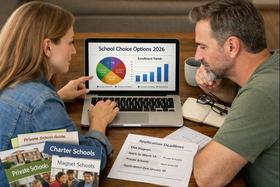Sadie Saulter serves 239 students in grades Prekindergarten-8.
The student-teacher ratio of 9:1 is lower than the North Carolina state level of 15:1.
Minority enrollment is 85% of the student body (majority Black), which is higher than the North Carolina state average of 57% (majority Black).
Quick Facts (2026)
- Grades: Prekindergarten-8
- Enrollment: 239 students
- Student-Teacher Ratio: 9:1
- Minority Enrollment: 85%
- Source: National Center for Education Statistics (NCES), NC Dept. of Education
School Overview
Sadie Saulter's student population of 239 students has declined by 20% over five school years.
Grades Offered
Grades Prekindergarten-8
Total Students
239 students
Gender %
Total Classroom Teachers
27 teachers
School Rankings
The diversity score of Sadie Saulter is 0.46, which is less than the diversity score at state average of 0.71. The school's diversity has stayed relatively flat over five school years.
Student-Teacher Ratio
9:1
15:1
American Indian
n/a
1%
Asian
2%
4%
Hispanic
8%
21%
Black
72%
25%
White
15%
43%
Hawaiian
n/a
n/a
Two or more races
3%
6%
All Ethnic Groups
Eligible for Free Lunch
99%
68%
School Statewide Testing
School District Name
Source: National Center for Education Statistics (NCES), NC Dept. of Education
Frequently Asked Questions
How many students attend Sadie Saulter?
239 students attend Sadie Saulter.
What is the racial composition of the student body?
72% of Sadie Saulter students are Black, 15% of students are White, 8% of students are Hispanic, 3% of students are Two or more races, and 2% of students are Asian.
What is the student-teacher ratio of Sadie Saulter?
Sadie Saulter has a student ration of 9:1, which is lower than the North Carolina state average of 15:1.
What grades does Sadie Saulter offer ?
Sadie Saulter offers enrollment in grades Prekindergarten-8
What school district is Sadie Saulter part of?
Sadie Saulter is part of Pitt County Schools.
School Reviews
Review Sadie Saulter. Reviews should be a few sentences in length. Please include any comments on:
- Quality of academic programs, teachers, and facilities
- Availability of music, art, sports and other extracurricular activities
Recent Articles

Back-to-School Tech & Online Learning Readiness Checklist
A 2026 guide to back-to-school tech & online learning readiness, helping families prepare devices, connectivity, skills, and safety.

How Public Schools Prepare for College in High School
Learn how public schools prepare for college and what parents should look for as students begin high school. Updated for 2026.

School Choice in 2026: What Parents Must Know
Explore how school choice is reshaping U.S. education in 2026, with updated trends, enrollment data, costs, policies, and practical guidance for parents.









